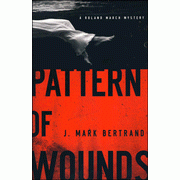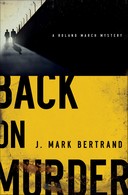 Pattern of Wounds, by J. Mark Bertrand (Bethany House, 2011)
Pattern of Wounds, by J. Mark Bertrand (Bethany House, 2011)
Detective Roland March is called to a Houston murder scene that’s eerily similar to his first big case, which was sensationalized in a true crime book. That killer’s in prison, but could someone have used the photos from the book as a pattern? Even worse, is the wrong man behind bars?
March follows up on every angle, but he also trusts his instincts. In his own words:
“The thing about instinct is, you follow without knowing where it’ll take you. You can’t explain why, and along the way nothing adds up, making you look like a fool. But working homicide, looking like a fool goes with the territory. That’s the job: getting it wrong until you finally get it right.” (p. 58-59)
As the story progresses, there’s a lot of getting it wrong before March finally gets it right. He blames others for allowing their biases to blind them to what he sees, but events make him question his own blind spots.
This book grabbed me on page one and kept me reading. Author J. Mark Bertrand has a tight, satisfying delivery and uses some strong visual imagery. Here’s an example where a character’s been asked a question: “He puts the photo down and leans back, checking the ceiling like his memories are kept up there.” (p. 312)
The story is told in the first person, which works well for a detective novel, and in the present tense, which doesn’t work so well for me except in chick lit. It’s probably intended to convey immediacy, but I find it a bit disconcerting.
Pattern of Wounds is put out by a Christian publisher, but it should please any lover of detective fiction. March himself has seen too much, lost too much, to find comfort in the faith in which he was raised. His wife, Charlotte, attends church without him, and he feels like she’s growing apart from him.
This is the second Roland March mystery (the first was Back on Murder) and while you don’t have to read them in order it’s a good idea. March is a richly complex character who changes over the course of the stories. I found it easy to care about him and Charlotte and their friends. I certainly hope there’ll be a book 3.
You can read the opening chapter of Pattern of Wounds on the Bethany House site and read an interview with J. Mark Bertrand as well. For something a little different, you can read a fictional interview with the Brad Templeton, the character who wrote the true crime book based on March’s famous case, The Kingwood Killing.
For a limited time, book 1, Back on Murder, is available for free as an eBook through Christian Book Distributors and in Kindle, Nook and Kobo formats.
You can learn more about J. Mark Bertrand and his books at his website and at his blog, Crime Genre.

